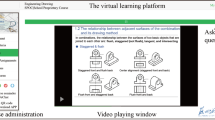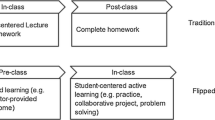Abstract
Popularity of videos for classroom instruction has increased over the years due to affordability and user-friendliness of today’s digital video cameras. This prevalence has led to an increase in flipped, K-12 classrooms countrywide. However, quantitative data establishing the appropriate video length to foster authentic learning is limited, particularly in middle-level classrooms. We focus on this aspect of video technology in two flipped science classrooms at the middle school level to determine the optimal video length to enable learning, increase retention and support student motivation. Our results indicate that while assessments directly following short videos were slightly higher, these findings were not significantly different from scores following longer videos. While short-term retention of material did not seem to be influenced by video length, longer-term retention for males and students with learning disabilities was higher following short videos compared to long as assessed on summative assessments. Students self-report that they were more engaged, had enhanced focus, and had a perceived higher retention of content following shorter videos. This study has important implications for student learning, application of content, and the development of critical thinking skills. This is particularly paramount in an era where content knowledge is just a search engine away.






Similar content being viewed by others
References
Alibali, R. S., & Siegler, M. (2004). Children’s thinking (4th ed.). Upper Saddle River: Pearson Education ISBN 0131113844.
Ambrose, S., Bridges, M. W., DiPietro, M., Lovett, M. C., & Norma, M. K. (2010). How learning works. San Francisco: John Wiley and Sons.
Bandura, A. (1977). Social learning theory. Englewood Cliffs: Prentice Hall.
Beesley, A., & Apthorp, H. (Eds.) (2010). Classroom instruction that works, second edition: Research report. Denver: McREL International. Retrieved from https://www.mcrel.org/wp-content/uploads/2016/03/McREL-research-report_Nov2010_Classroom-Instruction-that-Works_Second-Edition.pdf.
Bell, S. (2010). Project-based learning for the 21st century: skills for the future. The Clearing House, 83(2), 39–43.
Bergmann, J., & Sams, A. (2012). Flip your classroom: Reach every student in every class every day. Washington, DC: ISTE. International Society for Technology in Education.
Bishop, J.L., & Verleger, M.A. (2013). The flipped classroom: a survey of the research. 120th American Society for Engineering Education, Paper ID#6219.
Boster, F. J., Meyer, G. S., Roberto, A. J., Inge, C., & Strom, R. (2006). Some effects of video streaming on educational achievement. Communication Education, 55(1), 46–62. https://doi.org/10.1080/03634520500343392.
Boster, F. J., Meyer, G. S., Roberto, A. J., Lindsey, L., Smith, R., Inge, C., & Strom, R. E. (2007). The impact of video streaming on mathematics performance. Communication Education, 56(2), 134–144. https://doi.org/10.1080/03634520601071801.
Brígido, M., Borrachero, A. B., Bermejo, M. L., & Mellado, V. (2013). Prospective primary teachers’ self-efficacy and emotions in science teaching. European Journal of Psychology Education, 36(2), 200–217.
Cassidy, J., & Shaver, P. R. (1999). Handbook of attachment: theory, research, and clinical applications. New York: Guilford.
Cenric, P., Lookschijn, M. P., & Crone, E. A. (2013). Sex differences and structural brain maturation from childhood to early adulthood. Developmental Cognitive Neuroscience, 5, 106–118.
Chandler, P., & Sweller, J. (1991). Cognitive load theory and the format of instruction. Cogn Instr, 8(4), 293–332. https://doi.org/10.1207/s1532690xci0804_2.
Chase, W. G., & Simon, H. A. (1973). Perception in chess. Cognitive Psychology, 4(10), 55–81. https://doi.org/10.1016/0010-0285(73)90004-2.
DesLauriers, L., Schelew, E., & Wieman, C. (2011). Improved learning in a large-enrollment physics class. Science, 332(6031), 862–864.
DiMaggio, P. (1997). Culture and cognition. Annual Review of Sociology, 23(1), 263–287. https://doi.org/10.1146/annurev.soc.21.1.263.
Finkel, E. (2012). Flipping the script in K12. District Administration. Retrieved from www.districtadministration.com/article/flipping-script-k12.
Gardner, H. (2000). Can technology exploit our many ways of knowing? In D. T. Gordon (Ed.), The digital classroom: how technology is changing the way we teach and learn (pp. 32–35). Cambridge: Harvard College.
González-Gόmez, D., Jeong, J. S., Rodríguez, D. A., & Cañada-Cañada, R. (2016). Performance and perception in the flipped learning model: an initial approach to evaluate the effectiveness of a new teaching methodology in a general science classroom. J Sci Educ Technol, 25(3), 450–459.
Goodwin, B., & Miller, M. (2013). Research says evidence on flipped classrooms is still coming In: Technology rich learning. Educational Leadership. Retrieved from http://www.ascd.org/publications/educational-leadership/mar13/vol70/num06/Evidence-on-Flipped-Classrooms-Is-Still-Coming-In.aspx.
Guo, P., Kim, J., & Rubin, R. (2014). How video production affects student engagement: an empirical study of MOOC videos. Proceedings of the first ACM conference on Learning at scale conference, March 04–05, 2014, Atlanta, Georgia, USA. https://doi.org/10.1145/2556325.2566239.
Hamdan, N., McKnight, P., McKnight, K., & Arfstrom, K. (2013). A review of flipped literature. Retrieved from http://www.flippedlearning.org/review.
Hampton, C. (2002). Teaching practical skills. In A. K. Mishra & J. Bartram (Eds.), Perspectives on distance education: skills development through distance education (pp. 83–91). Vancouver: Commonwealth of Learning. Retrieved from http://www.col.org/SiteCollectionDocuments/Skills_Chapter09.pdf. Accessed 2 Oct 2016
Hamre, B., & Pianta, R. (2005). Student–teacher relationships. Retrieved from http://www.pearweb.org/conferences/sixth/pdfs/NAS-CBIII-05-1001-005-hamre%20&%20Pianta%20proof.pdf.
Hattie, J. (2008). Visible learning: a synthesis of over 800 meta-analyses relating to achievement. New York: Routledge.
Hill, J. R., Song, L., & West, R. E. (2009). Social learning theory and web-based learning environments: a review of research and discussion of implications. Am J Dist Educ, 23(2), 88–103. https://doi.org/10.1080/08923640902857713.
Jeong, J. S., González-Gómez, D., & Cañada-Cañada, F. (2016). Students’ perceptions and emotions toward learning in a flipped general science classroom. J Sci Educ Technol, 25(5), 747–758. https://doi.org/10.1007/s10956-016-9630-8.
Johnson, G.B. (2013). Student perceptions of the flipped classroom. Retrieved from https://pdfs.semanticscholar.org/a3ae/d2f5af55e65124d3369c3a605313e16a8ef7.pdf.
Kolmogorov, A. N. (1965). Three approaches to the quantitative definition of information. Problems of Information 1, 1–11.
Lage, J., Platt, G., & Treglia, M. (2000). Inverting the classroom: a gateway to creating an inclusive learning environment. The Journal of Economic Education, 31(1), 30–43.
Long, T., Logan, J., & Waugh, M. (2014). Students’ perceptions of pre-class instructional video in the flipped classroom model: a survey study. In Society for information technology & teacher education international conference 2014, (1), 920–927.
Mathy, F., & Feldman, J. (2012). What’s magic about magic numbers? Chunking and data compression in short-term memory. Cognition, 122(3), 346–362.
Mayer, R. E. (2002). Multimedia learning. Psychology of Learning and Motivation, 41, 85–139.
Mayer, R. E. (2009). Multimedia learning (2nd ed.). New York: Cambridge University Press.
Mayer, R. E., & Moreno, R. (2003). Nine ways to reduce cognitive load in multimedia learning. Educational Psychologist, 38(1), 43–52.
Moraros, J., Islam, A., Yu, S., Banow, R., & Schindelka, B. (2015). Flipping for success: evaluating the effectiveness of a novel teaching approach in a graduate level setting. BMC Medical Education, 15(1), 27. https://doi.org/10.1186/s12909-015-0317-2.
PBS and Grunwald Associates (2010). Deepening connections: teachers increasingly rely on media and technology. Retrieved from http://www.grunwald.com/pdfs/PBSGRUNWALD_2011_ANNUAL_ED_TECH_STUDY.pdf.
Pianta, R. C. (1999). Enhancing relationships between children and teachers. Washington, DC: American Psychological Association.
Rudolph, M. (2017). Cognitive theory of multimedia learning. Journal of Online Higher Education, 1(2). https://online-shc.com/arc/ojs/index.php/JOHE/article/view/11/11.
Sorden, S. D. (2012). Cognitive theory of multimedia learning. Retrieved from http://sorden.com/portfolio/sorden_draft_multimedia2012.pdf. Accessed 8 Aug 2017
Tucker, B. (2012). The flipped classroom. Education Next 12 (1): 82–83. Retrieved from http://educationnext.org/files/ednext_20121_BTucker.pdf.
Acknowledgements
We would like to thank the administrative staff of PJ Jacobs for supporting this study. We also thank the Institution Review Board at University of Wisconsin-Stevens Point for their guidance. We thank the University of Wisconsin Systems, Wisconsin Teaching Fellows and Scholars Program, for guidance and financial support.
Author information
Authors and Affiliations
Corresponding author
Ethics declarations
All procedures performed in studies involving human participants were in accordance with the ethical standards of the institutional and/or national research committee and with the 1964 Helsinki declaration and its later amendments or comparable ethical standards.
Informed Consent
Informed consent was obtained from all individual participants included in the study.
Animal Studies
This article does not contain any studies with animals performed by any of the authors.
Conflict of Interest
The authors declare that they have no conflict of interest.
Rights and permissions
About this article
Cite this article
Slemmons, K., Anyanwu, K., Hames, J. et al. The Impact of Video Length on Learning in a Middle-Level Flipped Science Setting: Implications for Diversity Inclusion. J Sci Educ Technol 27, 469–479 (2018). https://doi.org/10.1007/s10956-018-9736-2
Published:
Issue Date:
DOI: https://doi.org/10.1007/s10956-018-9736-2




